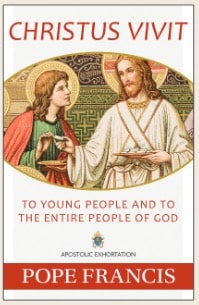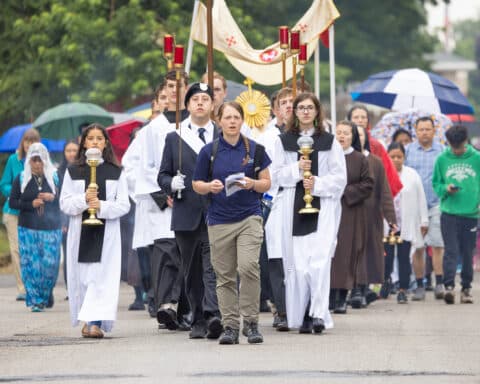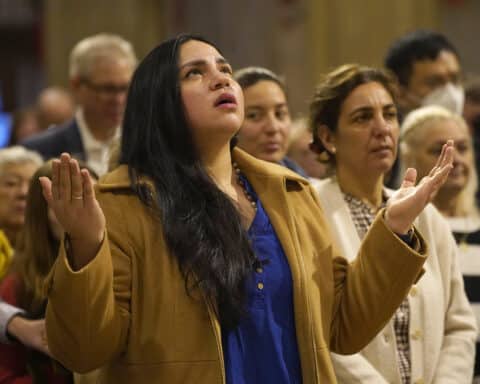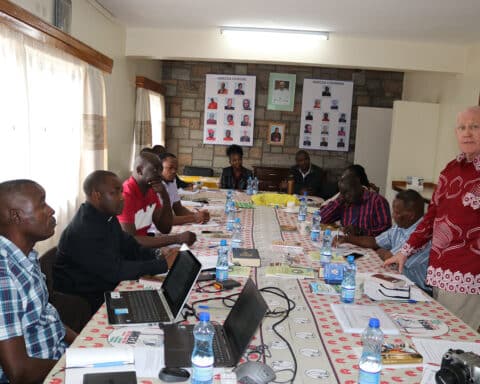The young adult years are a time of rapid change and transition. People in their 20s and early 30s are often moving homes, changing jobs, meeting new people and figuring out what they want to do in life.
In his recent apostolic exhortation, Christus Vivit (“Christ is Alive”), Pope Francis challenges young people to make the most of their youth and to be protagonists in the Church’s mission.
“Give yourselves over to the best of life!” the pontiff writes (No. 143).
Some parishes have ministries for young adults, but more often than not, a parish is a better fit for someone who has already settled down. Recognizing their innate need for community, young adult Catholics across the country have formed their own groups to enjoy fellowship with like-minded people their own age and to grow in faith as they discern their vocations.
Our Sunday Visitor interviewed the leaders of several young-adult Catholic groups across the country to see how they organize their ministries and what benefits those groups provide members, as well as to discuss the challenges of running a successful young-adult ministry.
| From Christus Vivit |
|---|
|
Available at osvcatholicbookstore.com. |
Salt and Light | Wichita, Kansas
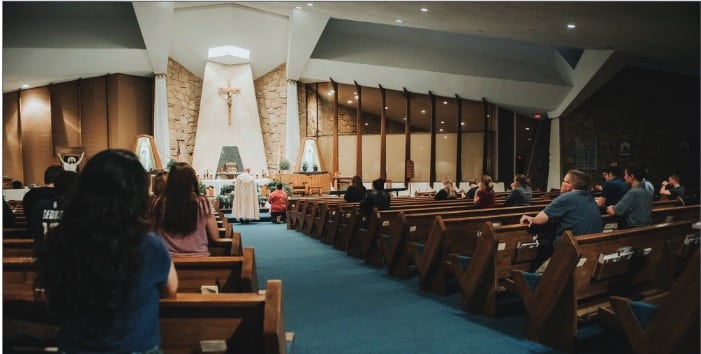
Tara Elpers thought she would find an active young-adult Catholic community when she moved back home to Wichita, Kansas, in 2013 after graduating college.
“I got here and realized we didn’t have that,” said Elpers, who took some initial steps to build the kind of community she enjoyed as an undergraduate at the University of Tulsa and later as a campus missionary with the Fellowship of Catholic University Students.
Elpers and her friends started out by praying for young adults in their diocese. They began a monthly Theology on Tap forum that drew around 30 people. Elpers and her friends began adding social and volunteer events, such as a weekly young-adult Mass followed by volleyball.

In time, the young adult Catholic community of Wichita — now known as Salt and Light — blossomed into a bustling ministry that has a 14-person leadership team that organizes regular spiritual, faith formation, volunteer and social events, and even has its own intramural sports leagues.
“It was just over several years of adding stuff here and there that now we have this full ministry,” said Elpers, who added that the community’s Theology on Tap now attracts anywhere from 150 to 200 people each month.
“God really paved the way for all this,” said Elpers, who works in human resources for FOCUS. “This shows that the young-adult population craves depth and relationships. First and foremost, they hunger for that relationship with Our Lord.”
Veronica Hill, a member of the Salt and Light leadership team who is responsible for organizing the Theology on Tap events, said the ministry provides a sense of community and belonging that smartphones and modern technology cannot give millennials.
“Everyone is looking to belong,” said Hill, an executive advancement associate at a local Catholic high school. “There is an entire generation of young people who feel a hunger to belong, to feel connected.”
Hill, who grew up “a casual Methodist” and converted to Catholicism in college, said Salt and Light meets a need for young adult Catholics who often feel that they don’t “fit in” at a parish since they don’t yet have families of their own.
“We minister to a more transitional demographic. We recognize that,” Hill said.
Given the transitory nature of young adulthood, Elpers and Hill recognize the challenges of keeping Salt and Light up and running. The people on the leadership team serve two-year terms, and Elpers said the group thus far has been able to attract new leaders who bring their own perspectives and ideas.
“Salt and Light is able to offer a good, solid Catholic community of people who are in the same state of life as one another, which I think is just really difficult to find in a parish when you’re in this particular stage of life,” said Elpers, who also credits Salt and Light with providing her and others an opportunity to grow in relationship with Christ.
“I think we need each other to be saints. We can’t do it on our own,” Elpers said.
Hill added that the community reminds her that there are other people her age who are striving for holiness.
“I could join a gym. I could join a young-professionals group,” Hill said. “But I love that this group has connected me with people who want to be saints first, people who are engaged in their communities and who are joyful.”
Arise Young Adult Apostolate | El Paso, Texas
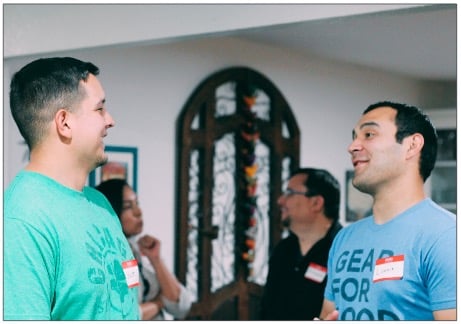
Before he joined the young adult ministry group at St. Raphael Church in El Paso, Texas, Paul Sandoval had never heard of Eucharistic adoration.
“I didn’t know words like theology, schism, evangelization, what they meant and what they were,” said Sandoval, who joined the parish young-adult group nearly four years ago. Today, he is a co-leader of the group, which is now called the Arise Young Adult Apostolate.
“Being in the group pushes me to be a better person,” Sandoval said. “Now when I go to daily Mass and I see another young adult there, I’ll think, ‘Oh man, she’s coming every day. I gotta come every day, too.'”
Personal spiritual formation and fostering a community where young adult Catholics could encourage each other and hold one another accountable were among the goals that Melissa Santos had when she decided to begin the group in September 2015.
“I went away to college, and when I moved back home, I felt like there weren’t any young adults or people my age who practiced their faith,” said Santos, who works as a financial analyst for her family business.
Adding that the Catholic faith has always been important to her, Santos said she felt “a tug” to begin a young adult ministry at her parish, especially since she had started a master’s degree in theology at the Augustine Institute.
“I thought, ‘Well, I’m learning all this stuff. I really need to share it with other people,'” Santos said.
The Arise Young Adult Apostolate meets twice a month for formation classes at St. Raphael Church. Santos said the group’s organizing principles focus on prayer, especially through the sacraments, as well as spiritual formation and evangelization.
“I think we’re losing a lot of young adults today because so many are not formed well,” said Santos, who added that she and Sandoval decided to name the group Arise after hearing the Gospel story of Christ telling the little girl in Mark 5:41, “Talitha koum” — “Little girl, I say to you, arise!” — as he brought her back to life.
“Just as she was dead, so many young adults today are dead from their attachments to sin in various ways,” Santos said. “It’s our challenge to get young adults to arise from that culture of death and sin, to arise to life in Christ.”
Santos, Sandoval and other group leaders are leading a summer formation series called, “Why am I Catholic?” that examines essential teachings such as the Eucharist, the Trinity, the saints and the Blessed Virgin Mary’s role in salvation history. In the fall, the group will begin a series called “Beloved,” which will focus on the Theology of the Body and what it means to live as men and women in relationship to one another.
“Everybody has grown closer over the years and taken the initiative to learn their faith,” said Sandoval, adding that members of the group often go to baseball games together and socialize. A few couples even have emerged from Arise.
“Especially with young adult ministry, it’s such a hard age,” Santos said. “There are so many life events that are happening. Everyone is just so busy with work and life, so to have an actual community of people, I think, is really important in order to continue growing in your faith in having people who can push you and encourage you.”
Books and Beer | Atlanta
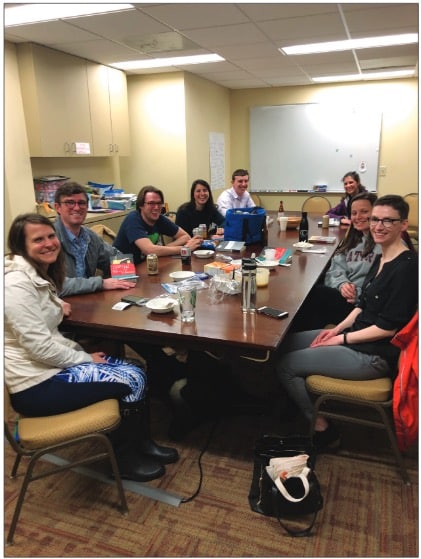
A young adult Catholic group called “Books and Beer” will definitely grab people’s attention.
“The majority of us prefer malt-forwards, stouts and porters. I really like Belgians, too, so I’ve brought in some Trappist ales,” said Jake Schirra, 26, who leads the Books and Beer young-adult group that meets at the Basilica of the Sacred Heart of Jesus in Atlanta.
The group of about eight to 10 young adults, most of them in their 20s, gathers weekly to discuss the works of Flannery O’Connor, J.R.R. Tolkien, Henry Graham Greene and other authors who write from a Christian perspective. The group enjoys those literary conversations over beer.
“I always bring sparkling water for those that don’t want to drink beer,” said Natalie Schirra, who started the group with her husband, Jake, last year during Lent. They met while studying at Vanderbilt University, where they enjoyed the support of a vibrant Catholic campus ministry.
“Once we graduated college, we didn’t have that anymore. I think that’s an experience for a lot of young adults who find their faith in college,” said Jake, who works in IT and moved to midtown Atlanta after he and Natalie, a high school teacher, got married two years ago.
They looked for a young adult community in Atlanta, but didn’t find one that fit. So they decided to create their own group, one that would attract people who would not necessarily join a Bible study but still wanted an element of spiritual and intellectual formation.
“We wanted to do it in a public place that was a little less churchy, so we decided to meet at a brewery in the area where we lived, and talk about the stories of Flannery O’Connor,” Jake said. “We have some great breweries in Atlanta.”
The group began meeting in a local brewery, but Jake and Natalie started hosting gatherings in their apartment before finally settling in to the parish basement.
“The brewery was really cool for awhile, but the cost of meeting there every week, people feeling pressured to buy something, and the noise level made it a little less conducive to conversation,” Natalie said.
The group used to meet every week, but Natalie and Jake shifted the format to an eight-week series, where the group meets weekly to read through and discuss a particular piece of fiction or nonfiction writing. The group then takes a month off before starting on another book.
“The added bonus of doing it that way is being able to re-advertise,” Natalie said. “There are natural starting and stopping points, so if people want to get involved who haven’t been before, they can come in and not feel awkward or completely new to the group.”
To break the ice when a new series starts, Natalie and Jake lead the group in talking about each other’s favorite beers and breweries in Atlanta. The group creates a sense of community for the members, most of whom are young, single and in a somewhat transient stage of life.
“For us as millenials, we’re changing jobs a lot, which means we’re constantly moving,” Jake said.
“I would say what unites the people in the group is that none of us have children,” Natalie said. “That’s the real challenge with young adult ministry. There will usually be one or two people who have an idea, they start it, it goes for a year, then when those people leave, the group dies.”
When they have children, Natalie said she and Jake will probably not be able to continue leading Books and Beer. They hope someone else will take the reigns of leadership. But for now, the group provides the support of like-minded young adults who share a common love and commitment to the Catholic faith.
“These are people who want to be faithful, who want to be part of the Church,” Jake said. “I think young adults everywhere are ready to form very vibrant communities if they can be shepherded well.”
Catholic Adventures | Stamford, Connecticut
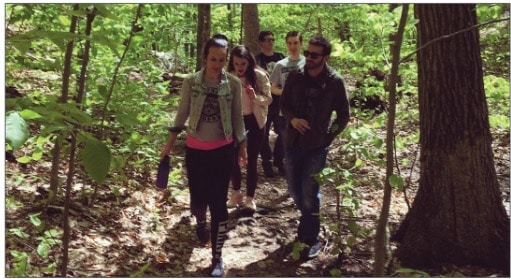
The dynamic young-adult Catholic scene in Fairfield County, Connecticut, has plenty of spiritually enriching activities for someone in their 20s and early 30s to grow in knowledge and love of the Catholic faith.
But Caitlin Stote and her friend, Staci Genovese, felt there was something missing for Catholics their age who wanted to socialize and have fun.
“We wanted to do things like hiking, bowling, trivia nights and community service,” said Stote, who co-founded Catholic Adventures of Stamford a year ago with Genovese and a couple of other friends.
“We wanted it to be like an adventure group,” said Genovese, who has gone ice skating, rock climbing and hiking with other young-adult Catholics who live in and around the cities of Norwalk and Stamford in southwestern Connecticut.
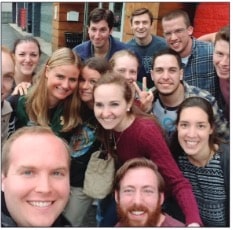
“We all became closer as we were going to events together like Faith on Tap,” Genovese said. “But the speakers would talk for a couple of hours, and that would be it. There wasn’t a big socialization piece to it.”
The Catholic Adventures group’s weekly events attract about 10 people on average. Their “adventures” have taken them all over Connecticut, from Greenwich to New Haven, meeting other young-adult groups, making new friends and attending their events.
In addition to socializing, Catholic Adventures offers a venue for spiritual growth and faith formation. On June 1, the group hosted a night vigil, where members went out on the streets of downtown Stamford to hand out rosaries and candles, and to invite people to attend Eucharistic adoration with them at a nearby parish.
Community service is another big component of Catholic Adventures. Group members often volunteer at a nonprofit that collects clothing for underprivileged people, as well as at another organization that revitalizes homes for people in need.
In addition, the group attends Eucharistic adoration monthly at a convent in Stamford and hosts a Bible study. This summer, the group plans to start reading through St. Francis de Sales’ spiritual classic, “Finding God’s Will For You.”
“We’re all very relatable and normal. We like to have fun,” said Stote, who teaches at a Catholic high school. Stote said a young-adult Catholic community provides a support system for Catholics who tend to be underserved by traditional parish and diocesan programs.
“A lot of the events at my parish are geared for people over 40 or people with families and young children,” Stote said. “A lot of events are not geared for people in this limbo age where you don’t have a family yet, but you’re also not a teenager, so there’s a need for that.”
After graduating from the University of Vermont, which she said had an active Catholic student center, Genovese said she at first had a difficult time finding a supportive young-adult Catholic community.
“Most of us are still in that singles period, and there are questions about how do we meet people who have the same faith as us,” Genovese said. “It’s nice to connect with people our age who share the faith and values that we have. It’s nice to be able to talk about the Catholic faith among your good friends.”
Credo | Nashville, Tennessee
“The Music City” is booming, and that is drawing young adult professionals from across the country.
“I’ll go to some events, and I’ll be the only Nashvillian there. Everybody else has moved to the city [from other places],” said Judd Cowan, who runs an aerospace fabrication shop in his hometown of Nashville, Tennessee.
Cowan is also on the leadership team of Credo, a young adult community based at Christ the King Church in Nashville’s Belmont and Hillsboro neighborhoods. Cowan was invited to become a group leader by one of Credo’s former leaders, who is now a religious sister.
“I’m a doer. I don’t like sitting still,” Cowan said. “I was always attracted to the idea of getting involved and helping to expand young-adult ministry in the diocese.”
Kelsey Callahan, who grew up in Georgia, was looking for a young-adult Catholic community when she moved to Nashville in 2015.
“I didn’t know the city that well,” said Callahan, a licensed professional counselor who added that a coworker told her about the young-adult group at Christ the King Church. She started attending a 6 p.m. young-adult Mass that was followed by a Bible study.
Callahan soon found herself being invited to join Credo’s leadership team.
“Being able to have that community and support is so important, especially when life can be very transient and busy,” Callahan said. “It’s great to have people who hold me accountable for the things I want to do in my spiritual life and challenge me on other things as well.”
Credo’s events are organized around four pillars: prayer, service, formation and social. The group attends a monthly parish Holy Hour, followed by a “Happy Hour” of socializing. There are service projects, such as volunteering to feed the homeless. The group also hosts regular talks and presentations on topics relating to Church history, the Mass, theology and Church teachings.
“You surround yourself with people you want to be more like, and that’s especially the case with Credo,” Cowan said. “There are a lot of people in the group who care deeply about their faith and empower each other to grow in their faith. I’ve seen people start to attend daily Mass because of Credo. It’s easier to do something when your friends are doing it.”
Credo’s social events include game nights, potluck dinners, bonfires and outdoor hikes. Those events usually draw the most people, sometimes more than 100.
“People who reach out to the group say they’re looking for community,” Callahan said. “There are a lot of people who are moving to Nashville without knowing anyone here. Knowing that there is a community here that is already set up for them is helpful.”
Cowan said he believes young adult Catholics in Nashville have a unique charism to evangelize each other and the community.
“At the end of the day, I personally feel you need a core group of friends you can trust and rely on,” Cowan said. “From there, you can reach out and bring people in and create a community. One of the core things about having that community is connection and a feeling of belonging. If you can create and foster that, you’re going to get people to come back.”
Brian Fraga is a contributing editor for Our Sunday Visitor.
| What about the dioceses? |
|---|
|
The common trend is that young adults feel forgotten by Church ministry once they graduate college or move to a new town. So, what are dioceses doing to support this demographic of the faithful? “Young adult ministry in a diocese is still pretty uncommon, especially operating on their own,” said Crystal Serrano, associate director of Young Adult Ministry for the Diocese of Fort Wayne-South Bend in Indiana. “It’s a little bit more common to have an office of youth and young adult ministry, but a lot of the time youth ministry takes priority.” Now, this is not to say there are no dioceses with such programs. Besides Fort Wayne-South Bend, Serrano mentioned others, such as the Archdioceses of Indianapolis, Chicago and Washington, D.C. Still, why so few? “I think that the Church just doesn’t know what to do with young adults,” said Serrano, who worked for the Archdiocese of Chicago before moving to Indiana. “For a really long time, I think that the Church operated on the idea that people will just come to us. However, we know that this isn’t the case anymore, and the Church has to take on a more active and intentional role in trying to do outreach with young adults. “I think it’s still the case that the Church is in a maintenance mode and is trying to meet the needs of those that are only within the walls of the church,” continued Serrano. “This is still necessary, but with the lack of intentional outreach, we see many young adults either taking a passive role in the life of the Church or all together leaving if they haven’t left already.” Serrano believes that the best way to reach young adults is to invest in those who are already disciples, build them up and send them out into their communities to evangelize those who may have received some catechesis but still don’t know Jesus. “I want to meet young adults where they are at and help them to take that next step that the Lord is calling them to,” she said. |


